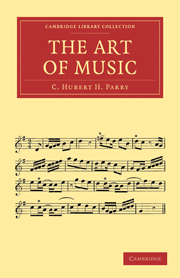Book contents
- Frontmatter
- Contents
- CHAPTER I PRELIMINARIES
- CHAPTER II SCALES
- CHAPTER III FOLK-MUSIC
- CHAPTER IV INCIPIENT HARMONY
- CHAPTER V PURE CHORAL MUSIC
- CHAPTER VI THE RISE OF SECULAR MUSIC
- CHAPTER VII COMBINATION OF OLD METHODS AND NEW PRINCIPLES
- CHAPTER VIII CLIMAX OF EARLY INSTRUMENTAL MUSIC
- CHAPTER IX BEGINNINGS OF MODERN INSTRUMENTAL MUSIC
- CHAPTER X THE MIDDLE STAGE OF MODERN OPERA
- CHAPTER XI THE MIDDLE STAGE OF “SONATA” FORM
- CHAPTER XII BALANCE OF EXPRESSION AND DESIGN
- CHAPTER XIII MODERN TENDENCIES
- CHAPTER XIV MODERN PHASES OF OPERA
- SUMMARY AND CONCLUSION
- INDEX
CHAPTER IX - BEGINNINGS OF MODERN INSTRUMENTAL MUSIC
Published online by Cambridge University Press: 29 August 2010
- Frontmatter
- Contents
- CHAPTER I PRELIMINARIES
- CHAPTER II SCALES
- CHAPTER III FOLK-MUSIC
- CHAPTER IV INCIPIENT HARMONY
- CHAPTER V PURE CHORAL MUSIC
- CHAPTER VI THE RISE OF SECULAR MUSIC
- CHAPTER VII COMBINATION OF OLD METHODS AND NEW PRINCIPLES
- CHAPTER VIII CLIMAX OF EARLY INSTRUMENTAL MUSIC
- CHAPTER IX BEGINNINGS OF MODERN INSTRUMENTAL MUSIC
- CHAPTER X THE MIDDLE STAGE OF MODERN OPERA
- CHAPTER XI THE MIDDLE STAGE OF “SONATA” FORM
- CHAPTER XII BALANCE OF EXPRESSION AND DESIGN
- CHAPTER XIII MODERN TENDENCIES
- CHAPTER XIV MODERN PHASES OF OPERA
- SUMMARY AND CONCLUSION
- INDEX
Summary
It would have been an eminently pardonable mistake for any intelligent musician to have fallen into in the third quarter of the eighteenth century, if he concluded that J. S. Bach's career was a failure, and that his influence upon the progress of his art amounted to the minimum conceivable. Indeed the whole course of musical history in every branch went straight out of the sphere of his activity for a long while; his work ceased to have any significance to the generation which succeeded him, and his eloquence fell upon deaf ears. A few of his pupils went on writing the same kind of music in a half-hearted way, and his own most distinguished son, Philip Emmanuel, adopted at least the artistic manner of working up his details and making the internal organisation of his works alive with figure and rhythm. But even he, the sincerest composer of the following generation, was infected by the complacent, polite superficiality of his time; and was forced, through accepting the harmonic principle of working, to take with it some of the empty formulas and conventional tricks of speech which seem to belie the genuineness of his utterances, and put him out of touch with his wholehearted father.
- Type
- Chapter
- Information
- The Art of Music , pp. 211 - 232Publisher: Cambridge University PressPrint publication year: 2009First published in: 1893

